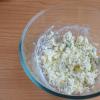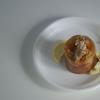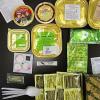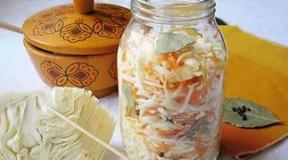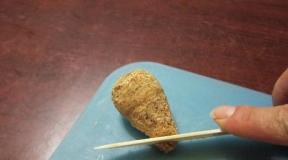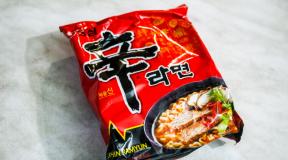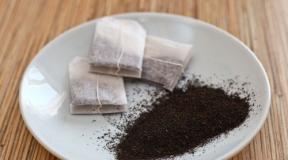Rolls are harmful. The benefits of rolls and how they differ from sushi
(No ratings yet)

Rolls - dish with exotic name, which is gradually included in the diet of Russian citizens. What are rolls, why are they so loved and what are their benefits to humans? You can see this dish on the menu in almost any restaurant. It will not be difficult to order rolls to your home or office. These small mouth-watering rolls are popular for their unusual taste.
What are rolls and how are they prepared
It has become fashionable to order this dish, and for many establishments catering such a service as free shipping rolls and sushi has become commonplace. Rolls belong to the national dishes of Japanese and korean food and, in fact, are varieties of sushi in which two classic ingredients is rice and raw fish (salmon, tuna). Unlike sushi, which is a strip of boiled rice covered with a thinly sliced \u200b\u200bpiece of fish and tied with leaves of dried nori seaweed, rolls are prepared in a slightly different way.
The essence of their preparation is evident from the name. Translated from of English language roll means roll. A layer of cooked glutinous rice is laid out on a nori leaf, followed by fish, avocado, vegetables or other ingredients, depending on the recipe chosen. This whole structure is tightly rolled into a roll using a special bamboo mat - makisu and cut into small pieces.
Today, sushi men are people who are trained to properly cook rolls and who work in numerous cafes, restaurants and sushi bars, offer customers a large selection of varieties of this dish. Of course, the most popular rolls are classic "California" and "Philadelphia".

Their name was not chosen in vain, because it was in America in the 70s of the last century that this dish appeared, which conquered the whole world. The origin of the rolls is the Japanese chef Ichiro Mashita, who worked in Los Angeles in those years. It was he who adapted sushi for the American people and invented it. new varietycalled roll.
Are rolls good for humans?
To understand whether rolls are useful for a person, you need to look at what they are made of. These are rice, seaweed, fish or seafood, avocado, cucumber and cheese, used in some types of food. All of these ingredients themselves have mass useful properties and each of them contains a wide variety of different vitamins, trace elements and substances necessary the human body.
So, rice helps a person maintain natural beauty and replenishes the body with energy. Fish is a supplier of potassium and phosphorus, vital elements for the body. This product has at all times been recognized as "food for the brain" and protector against atherosclerosis. Nori seaweed contains a large number of iodine, which is essential for the proper functioning of the thyroid gland. Soy sauce, ginger and wasabi, which are used as spices, activate the stomach.
There is no need to talk about the benefits of avocados and vegetables at all. It contains great amount minerals and useful vitamins... Based on the foregoing, we can make an unambiguous conclusion - rolls are useful for a person, but on one condition. They should only be prepared from fresh food... Today, afford to buy delicious and useful rolls can not only residents of cities such as Moscow and St. Petersburg. In Russia, this dish has become so popular that it is offered by catering establishments in all more or less large settlements.
Rolls: benefit or harm - which will win ?!

Are rolls and diet compatible
Can rolls be attributed to dietary meals? This question worries many, especially women who have decided to go on a diet, who do not like to feast on these exotic dishes. According to Carol Ann Rinzler, author of the bestselling Weight Loss for Dummies, rolls, which can be purchased at very low prices today, are a prime example. healthy food with a low fat content, but actively saturating the body with energy. For those wishing to lose weight, Carol suggests choosing the right dish.
It should contain as much as possible more fish, since it is in it that Omega-3 fatty acids are found, which activate the brain and provide the body with vitamin D and proteins. Plus, salmon and tuna are low in calories. Of course, you should not, while on a diet, eat only one rolls, but please yourself with a small portion of these great products several times a week is fine.
For lovers of rolls, a chain of restaurants japanese food "Niyama" offers home delivery or waits for its customers in establishments located in Moscow and other cities of Russia.
Sushi nowadays takes many forms, but classic recipe remains unchanged: raw fish, nori and rice. Serving spices is considered mandatory for the dish: soy sauce and.
The benefits and harms of sushi
First of all, the benefits and harms of sushi and rolls are determined by their composition, so we will understand in detail.
Healthy foods:
- Rice... Protein and fiber, which are sourced from rice, participate in the structure of cells, and also improve the process of digestion. However high glycemic index makes people with diabetes, for example, treat sushi with caution.
- Sea fish... Thanks to phosphorus and other beneficial substances, the product develops mental activity, improves the functioning of the cardiovascular and digestive systems.
- Wasabi... Most useful component japanese food... The product is an excellent antiseptic, which allows it to block development cancer cells in the stomach.
- Ginger... A strong immunostimulant that also has properties.
Dangerous products:
Despite hazardous components, the benefits of sushi and rolls are obvious, especially if you approach their choice responsibly.
- Order Japanese cuisine only in trusted and reliable places, if you are not sure about the suppliers of the institution, then it is better to refrain from buying sushi with raw fish.
- Eating sushi will be beneficial and enjoyable, not harmful to health, if you use the "principle of moderation" like the Japanese.
- It is safest to give preference to fish that has undergone heat treatment.
- Despite the love for Japanese cuisine, it is important to remember that regularity is important in eating sushi, not frequency.
The obvious benefits of sushi and rolls and the irreparable harm they can cause to the human body suggest that the choice of any exotic dish must be approached responsibly.
To say that Japanese cuisine is very popular in Russia is to say nothing. She has already become so "her own on the board" here, and I can't even believe that not so long ago few people knew about the existence of rolls and sushi. But Japanese cuisine has powerfully burst into the Russian food industry and immediately won the love of many Russians.
It should be noted that not only Russians were seized by this love. We can safely state the fact that Japanese cuisine is popular all over the world and is even considered a culinary art phenomenon.
Features of Japanese cuisine
It is quite simple to characterize the national Japanese cuisine: it is a combination of quality and beauty. In Japan, they prefer natural taste sensations and have great respect for food and the process of making it.
- Rice can rightfully be called the main thing in Japanese cuisine. The Japanese cannot imagine a full meal if there is no rice on the table. It is cooked different ways, served both independently and with soups, salads, fish.
- No less important product one can name fish and seafood, of which there are quite a lot in Japan, since the sea fishery there is widely developed throughout the year.
- Frequent guests on japanese tables are also vegetables, soybeans, mushrooms, seaweed, various spices.
- The Japanese practically do not use meat and consider it their secret of health and longevity.
- Great importance is attached to the quality of the products. They must be exceptionally fresh. This is also important because heat treatment is minimally used in Japanese cuisine. So fish and seafood are mainly consumed in an absolutely raw form.
- Japanese servings are usually small, but the dishes on the table are quite varied.

- In Japan, they usually eat with their hands, or with chopsticks from various tree species.
- As for rolls and sushi, they are considered the main dish of traditional Japanese cuisine, however, it should be said that the Japanese themselves do not eat rolls and sushi every day.
- Another interesting fact is that in Japan, it is considered traditional to cook sushi exclusively by men. Women are not allowed to this action.
- The Japanese prefer to drink green tea... Various tea ceremonies are a daily traditional ritual of every family.
Differences between Japanese cuisine in Russia
Obviously, the peculiarities of Japanese cuisine are due to its territorial location, as well as love for beauty and detail, for the freshness of products and adherence to traditions. Probably, it was all this that attracted European countries, which fell in love with Japanese cuisine so much, after which this love was also passed on to Russia.
Of course, Japanese cuisine in Russia has some differences from traditional Japanese cuisine:

And, nevertheless, today, without exaggeration, in every shopping center, even at stops in the pavilions, in almost every cafe and restaurant you can find a Japanese menu. And among the companies involved in food delivery, the delivery of Japanese cuisine ranks first in terms of the number of orders.
What is it? Is it really a love of the taste of rolls and sushi, or is it a tribute to fashion? If Japanese cuisine is fashion, then how can it not only not disappear into the past, like any fashionable trend, but only gain and gain popularity?
Secrets of the popularity of traditional Japanese cuisine
There is perhaps no secret, but there is an obvious fact that many people really love Japanese cuisine and there are many reasons for this:
The benefits of Japanese cuisine
As a separate point, I would like to highlight the question of the benefits of sushi and rolls, which is exciting to many.
Those who are at least somewhat versed in useful products, it is obvious that rice, rich in fiber, combined with sea fish, saturated useful elementsare, of course, healthy and wholesome food... What can we say about Nori seaweed, which is rich in iodine, which is so necessary for the thyroid gland, as well as other vitamins and minerals, one continuous benefit.
Even the Japanese wasabi seasoning, along with pickled ginger, which is an addition to sushi, has disinfecting and immunostimulating properties. Last but not least, soy sauce is beneficial for various body systems. The conclusion about the usefulness of Japanese cuisine suggests itself, and there are also few calories, which of course is also important for those who follow the figure.
Harm to Japanese cuisine
But is everything so great, or is there any harm from Japanese cuisine? It is worth considering, perhaps, every component of sushi and rolls that can be dangerous.
Obviously, claims about the dangers of rolls and the dangers of sushi as such have no basis, but, nevertheless, there are certain precautions that you should pay attention to before eating Japanese dishes:

Another way to enjoy your favorite Japanese cuisine without harm to your health is self-cooking sushi and rolls at normal home conditions. Many have already tried themselves as a sushi chef and will confirm that there is nothing super complicated in this. And most importantly, you know exactly how fresh and quality products used for your dinner.
It is also important that self-cooking is much cheaper. Well, pride in the fact that so exotic dish handmade, triples the pleasure. Fish, by the way, in this case, use slightly salted, slightly soaked in water, it is the safest.
In conclusion, I would like to say, one way or another, everything that we eat, this applies not only to Japanese cuisine, should not only be tasty, but, first of all, useful. And the usefulness lies not only in the composition of this or that product, but also in the quality, in its freshness.
Most delicious food should be prepared from quality, fresh and rich useful substances products. It is possible to achieve something that is both tasty and healthy, and it is not difficult at all. And following simple tips of this article, perhaps you will eventually discover the secret of the longevity of the Japanese, who gave us these amazing and infinitely desirable rolls and sushi.
Sushi and rolls - popular dishthat comes from Japan. For several years in a row, restaurants have been replenishing their menus with varieties of Chinese and Japanese cuisine. Sushi cannot be compared to any other fish dish: they have unique taste... But what is the harm and benefit of sushi and rolls?
Concept
The people of Japanese cuisine are loved by the world. The basis of sushi is rice with seafood, rolls are a type of sushi modernized by European chefs. Rolls round form, sushi looks like oblong rice lumps covered with fish. The difference is also in the manner of combination, fillings. There is a whole variety of rolls.
Popular types:
- colored;
- mosaic;
- "California";
- inside out;
- "Philadelphia";
- "Green Dragon" and so on.
Prepare the rolls so that when rolled into a roll, the nori sheet is outside, the filling with rice inside (there are varieties in which the nori is inside, and the rice is outside).
What is the harm from sushi and rolls
I wonder why rolls are harmful? Their main feature - preservation of the original appearance and taste of the main ingredients. For sushi to be tasty, the food must be fresh.
To avoid health problems, nutritionists recommend eating sushi no more than two to three times a week. To block growth harmful organisms there is better with the addition of wasabi, which is an antiseptic.
Are there any benefits of sushi and rolls?
 The same dishes can be both good and bad. It all depends on the literacy of the chefs and ingredients, the volume of absorption. The Japanese delicacy is healthy when consumed in moderation.
The same dishes can be both good and bad. It all depends on the literacy of the chefs and ingredients, the volume of absorption. The Japanese delicacy is healthy when consumed in moderation.
Their benefits:
- Rice supplies the body and muscles with fiber and protein when consumed in moderation
- Wasabi when eaten in small amounts is useful in killing cancer cells, excess is harmful - it causes arthritis.
- Ginger has anti-inflammatory properties, strengthens the immune system, and is good for the digestive system;
- Fish is rich in phosphorus and omega-3.
- Nori leaves are rich in iodine, calcium, iron.
Sushi and rolls contain fat-saturated amino acids, proteins, useful trace elements... They have a positive effect on blood vessels, benefit the heart and normalize body weight.
Sushi and rolls during pregnancy
During pregnancy, women are more concerned about their lifestyle. The main issue in the situation is nutrition. Harmful products can harm the development of the fetus and provoke complications when carrying a child. Doctors strongly advise pregnant women not to eat sushi for a number of reasons.
There are rolls in position, with restrictions and adjustments, in moderation. At the same time, self-prepared rolls and sushi will not benefit pregnant women if the selection of products is incorrect.
Symptoms and first aid for poisoning
Poisoning of sushi is possible if the fish has not undergone heat treatment, the products were not fresh and the chef who prepared them did not observe hygiene standards. Symptoms of poisoning appear half an hour after the product enters the body and are rapidly gaining momentum.
Symptoms:
- Toxicosis, vomiting;
- Weakness;
- Bloody diarrhea;
- Fever
- Desires from the urinary system.
Causes:
This intoxication is dangerous to health, because it can lead to death. Timely hospitalization will help to avoid a tragic situation. In the hospital, with the help of droppers, the water balance is restored and drugs are injected for quick withdrawal toxins.
Prevention (how to use it correctly)
Precautions, if properly followed, will save rolls from intoxication or prevent subsequent poisoning. There are some rules for avoiding harm.
These include:
- Correct selection of establishments, choice only with high marks and positive reviews;
- Thorough washing of hands with soap before meals;
- Checking the shelf life of a dish taken to order;
- Refusal of dishes with a bad smell, view;
- Eating rolls on the day of purchase;
- Careful selection of products.
Everything is useful if you eat in moderation. You shouldn't give preference to Japanese cuisine only. A balanced and varied diet is the key to a long and healthy life.
How to use sushi and rolls correctly?
Sushi is served in small portions, the roll is cut into pieces. They eat whole, and from attempts to divide into parts is lost appearance, the taste is not so bright.
Wasabi and ginger, soy sauce are served with sushi. Ginger is needed for cleaning taste buds... Wasabi is Japanese horseradish.
Video shock: the benefits and harms of sushi and rolls
Over the past few years, Japanese cuisine has exploded in popularity. Today sushi and rolls are not just dishes of Asian origin, but a real tribute to fashion. Evidence of the popularity of such a peculiar cuisine can be observed on the streets of any city in the post-Soviet space: in the countries of Eastern Europe japanese restaurants more than national ones. Hardly anyone will want to go to a cafe to eat borsch on their birthday - give everyone sushi! But what Japanese cuisine is fraught with, people practically do not know. Let's figure it out together, is sushi good or bad for the body? But first things first.
The benefits of sushi
Like any other product, fish meals of asian food at moderate consumption do not pose a danger to the body. Moreover, rolls are even beneficial for health, because they are rich in vitamins and minerals. The main and the most important component sushi - fish. The dish is made from tuna, salmon, eel and other marine inhabitants. Fish is known to be rich in riboflavin and omega-3 fatty acids, contributing to the stimulation of mental activity. Besides clearly positive impact on the cells of the brain, the product affects the work of the cardiovascular system, strengthening the capillaries and arteries.
The second equally important component of sushi is boiled rice... The Japanese turned out to be quite savvy, connecting in national dish products with high nutritional value... Rice refers to cerealsso it is rich in fiber and other necessary for the body microelements. Besides, rice porrige allows you to quickly satisfy your hunger.  Rolls and sushi are wrapped, as a rule, in nori - a variety seaweed... The huge advantage of the ingredient is that it contains a significant amount of iodine, which is necessary for the normal functioning of the thyroid gland. By the way, in sea \u200b\u200bfish also contains a certain dose of this trace element. Thus, the benefits of sushi are expressed in the prevention of thyroid diseases and related symptoms.
Rolls and sushi are wrapped, as a rule, in nori - a variety seaweed... The huge advantage of the ingredient is that it contains a significant amount of iodine, which is necessary for the normal functioning of the thyroid gland. By the way, in sea \u200b\u200bfish also contains a certain dose of this trace element. Thus, the benefits of sushi are expressed in the prevention of thyroid diseases and related symptoms.  Contribute and additional components asian food... Japanese cuisine involves the use of various hot spices and additives, so you can't do without specific ingredients when eating rolls. Three foods that invariably accompany a meal are soy sauce, ginger and wasabi. Each roll is dipped in soy sauce before tasting. The product enhances the taste of fish and neutralizes the dryness of rice. Soy sauce has strong antioxidant properties and promotes blood circulation. Another specific component of the dish is wasabi. The so-called "Japanese horseradish" is used as a powerful antiseptic, because fish for sushi does not undergo heat treatment, which is quite dangerous. Rolls are eaten with a bite with pickled ginger. The plant has pronounced antiviral properties and increases immunity, so it is useful to use it in the autumn-winter period.
Contribute and additional components asian food... Japanese cuisine involves the use of various hot spices and additives, so you can't do without specific ingredients when eating rolls. Three foods that invariably accompany a meal are soy sauce, ginger and wasabi. Each roll is dipped in soy sauce before tasting. The product enhances the taste of fish and neutralizes the dryness of rice. Soy sauce has strong antioxidant properties and promotes blood circulation. Another specific component of the dish is wasabi. The so-called "Japanese horseradish" is used as a powerful antiseptic, because fish for sushi does not undergo heat treatment, which is quite dangerous. Rolls are eaten with a bite with pickled ginger. The plant has pronounced antiviral properties and increases immunity, so it is useful to use it in the autumn-winter period.
If we talk about sushi in general, without focusing on individual components, the dish can be considered a real boon for people struggling with extra pounds. Fish and rice products promote faster fat burning, normalize metabolism and even help eliminate depression.
Sushi harm
 Unfortunately, our article will not end with enthusiastic speeches, as sushi has some negative sides... We recommend that you use caution and moderation in your meals to insure against possible problems with health. The first and most dangerous point regarding rolls is raw fish, which is part of the dish. Salmon and tuna are excellent taste even without heat treatment, but they can become a haven for disease-causing bacteria and worms. Even long-term salting or smoking does not allow to completely destroy the dangerous "inhabitants".
Unfortunately, our article will not end with enthusiastic speeches, as sushi has some negative sides... We recommend that you use caution and moderation in your meals to insure against possible problems with health. The first and most dangerous point regarding rolls is raw fish, which is part of the dish. Salmon and tuna are excellent taste even without heat treatment, but they can become a haven for disease-causing bacteria and worms. Even long-term salting or smoking does not allow to completely destroy the dangerous "inhabitants".
Doctors are especially distrustful of tuna sushi. The fact is that lately the purity of the world's oceans leaves much to be desired. Water bodies are littered with waste and toxins, including mercury. Tuna is one of the long-livers of the deep sea, so a critical amount of toxic metal can accumulate in its fillets. Of course, having eaten several rolls, you will not get poisoned, but frequent consumption of the product in food (more than 2-3 times a week) can be dangerous.  Hides pitfalls and soy sauce. Yes, in small quantities the product is useful, but do not forget that the liquid is concentrated, as it contains a lot of salt. Soy sauce can cause arthritis and other joint problems. Nori algae have a negative impact on health only due to their high iodine content. A lack of substance promises malfunctioning of the thyroid gland, and an excess of it leads to the same problems. So, try not to lean on sushi, you should eat no more than 5 pieces at a time.
Hides pitfalls and soy sauce. Yes, in small quantities the product is useful, but do not forget that the liquid is concentrated, as it contains a lot of salt. Soy sauce can cause arthritis and other joint problems. Nori algae have a negative impact on health only due to their high iodine content. A lack of substance promises malfunctioning of the thyroid gland, and an excess of it leads to the same problems. So, try not to lean on sushi, you should eat no more than 5 pieces at a time.
We do not advocate a complete rejection of Japanese cuisine, but we advise you to be careful. Firstly, try to give up going to questionable cafes, choose trusted restaurants with a good reputation. Secondly, be sure to eat wasabi sushi to kill as many bacteria as possible. Third, observe the measure.






